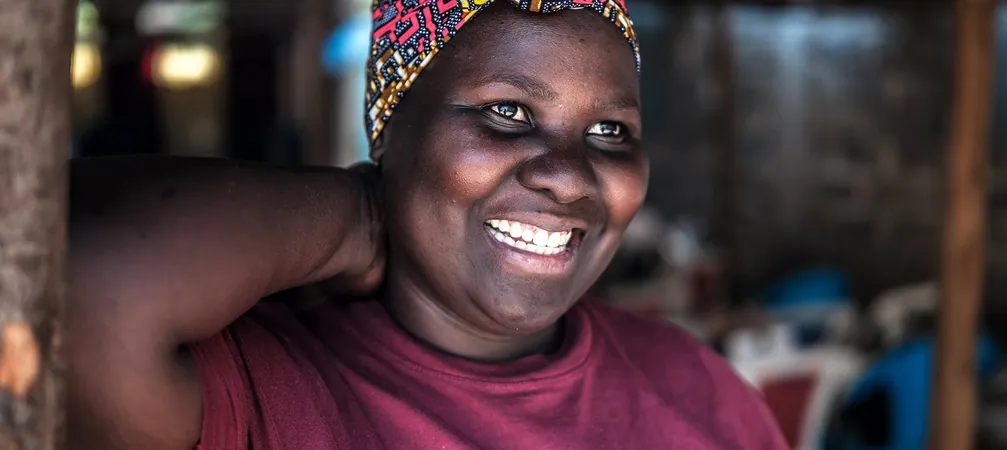
Milicent's Fight Against Cervical Cancer: A Journey of Resilience and Advocacy
2024-11-18
Author: John Tan
Cervical cancer is often a silent killer, manifesting through gradual and often overlooked symptoms. For Milicent Kagonga, a courageous 36-year-old mother of three, early signs like irregular bleeding and pelvic pain were mistakenly dismissed for years until a life-altering diagnosis brought her face-to-face with the reality of stage 4 cervical cancer.
At just 20, Milicent recalls the excruciating abdominal pain that plagued her. Speaking about her struggles, she expressed, "It was almost impossible to open up about my symptoms due to the stigma. Conversations about health, especially anything related to reproductive issues, were taboo in my community." Compounding the physical challenges, her health deteriorated, which took a toll on her marriage, leading to emotional despair as she navigated her illness alone.
The tipping point came while she was working as a housekeeper. Distraught and in pain, she stumbled upon a TV program discussing cervical cancer symptoms, and the reality hit her hard. “I thought cervical cancer was a disease for wealthy people who could seek medical help. In my community, cancer is an alien concept—there’s no term for it, which means people simply don’t acknowledge its existence,” she recalled.
When Milicent finally mustered the courage to seek help, she faced another hurdle—the medical staff at her local hospital refused to run tests on her because she was under 35. Instead, she was prescribed painkillers and sent home. Even after returning numerous times due to persistent health issues, it wasn’t until she was diagnosed with advanced cervical cancer that she truly understood the gravity of her situation.
The treatment options—surgery, radiation, and chemotherapy—were daunting, yet the financial burden it placed on her was unbearable. “They told me the treatment would cost $450. I was helpless; the costs were insurmountable,” she sighed. After many sleepless nights worrying about her future, a friend directed her to Kenyatta National Hospital, a facility known for providing affordable cancer care.
“My heart soared with gratitude when I learned I could receive treatment. Thankfully, my health insurance helped cover part of the cost, and the kindness of friends and fellow survivors filled the gaps,” Milicent recounted. Yet her ordeal did not end there; enduring harsh hospital conditions, she often had to sleep on the hospital floors, waiting for her next round of treatment.
Tragically, in Kenya, around eight women lose their lives to cervical cancer daily, with an overwhelming 90% of cases diagnosed at advanced stages. The primary cause is the human papillomavirus (HPV), a widely prevalent virus that nearly everyone will encounter at some time in their lives. While only a few strains of HPV lead to cervical cancer, the stigma associated with the virus complicates matters further. Milicent faced isolation and prejudice once her diagnosis became public, with many in her community believing her condition stemmed from witchcraft or some form of punishment. “It was harrowing; some even suggested I should end my own life. The discrimination was as painful as the disease itself,” she confided.
Against this backdrop of struggle, Milicent’s journey morphed into an inspiring tale of survival and advocacy. In 2019, she took a bold step and founded the "Symbol of Hope Warriors," a nonprofit organization committed to supporting others battling cancer. This initiative has provided relief to over 5,000 individuals through food assistance, accommodation, and health insurance aid.
Now, she is embarking on a project to build a safe house for children orphaned by cancer in Kitale, aiming to protect young souls from the stigma associated with their loss. “These children deserve a nurturing environment, free from the burden of community judgment while they navigate their grief,” Milicent explained passionately.
Milicent, alongside fellow cancer survivors, actively advocates for cervical cancer awareness and the significance of the HPV vaccine in schools and communities. Her initiative has reached over 26 schools, where she is known affectionately as “Yule mama wa cancer” or "the cancer mother." “I urge women to prioritize their health and ensure their children receive the HPV vaccine, a preventative measure that can save lives,” she asserts.
Despite the progress in initiatives, statistics reveal that in 2021, only 31% of eligible girls in Kenya completed the two-dose HPV vaccine series. Yet, as a beacon of hope, Milicent proudly shared her daughter was among the first girls in Kenya to be vaccinated.
Cervical cancer is a preventable disease when detected early. Regular screenings like Pap smears can unveil precancerous changes, yet access to these services is often hindered by socioeconomic barriers and cultural stigma. “My mission is to change this narrative,” Milicent stated. “Cervical cancer does not have to be a death sentence; the fear and shame surrounding it do immense damage.”
Her story is more than just one of survival; it highlights the critical importance of awareness, understanding, and the urgent need for systemic changes within women’s healthcare. Milicent’s persistence and unwavering spirit not only advocate for necessary healthcare reforms but also inspire others with similar struggles to find strength in their adversity.
As Milicent continues her selfless fight against both cervical cancer and the stigma that accompanies it, she serves as a powerful reminder of the necessity for community support and education in the battle against this deadly disease.


 Brasil (PT)
Brasil (PT)
 Canada (EN)
Canada (EN)
 Chile (ES)
Chile (ES)
 España (ES)
España (ES)
 France (FR)
France (FR)
 Hong Kong (EN)
Hong Kong (EN)
 Italia (IT)
Italia (IT)
 日本 (JA)
日本 (JA)
 Magyarország (HU)
Magyarország (HU)
 Norge (NO)
Norge (NO)
 Polska (PL)
Polska (PL)
 Schweiz (DE)
Schweiz (DE)
 Singapore (EN)
Singapore (EN)
 Sverige (SV)
Sverige (SV)
 Suomi (FI)
Suomi (FI)
 Türkiye (TR)
Türkiye (TR)